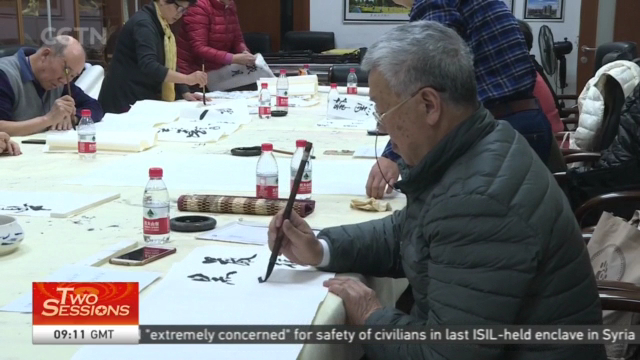
18:01, 13-Mar-2019
Golden Years: China services its senior citizens
Updated
18:00, 16-Mar-2019
03:24

How to care for China's aging population is a growing challenge. By 2030, one quarter of the people are expected to be at least 60 years old. Uche Okoronkwo looks what's being done for the elderly.
At a community centre in Beijing, former dancer, Gao Jiping guides her elderly students into an upbeat number.
GAO JIPING DANCE TEACHER "Dancing makes my students lives more colorful, and I'm enjoying this."
Just around the corner, Wang Hengbi participates in a calligraphy class. He says coming here is an important part of his weekly schedule.
WANG HENGBI RETIREE "This place provides us a space and tools to practice. I come here to improve my calligraphy skill. I'm here twice a week."
In the next room, another group is performing Beijing's ancient and popular Peking opera. These are just a few of the many activities offered to China's senior citizens across dozens of community centres across the city.
UCHE OKORONKWO BEIJING "China's elderly population is estimated at around 200 million. That number is forecast to rise by between 20- 35 percent by 2050. The government has had to figure out how to tackle the challenges that come with an aging population, and at the same time provide them access to diverse elderly care services."
The aim is to establish an adequate support network. To avoid lonliness and neglect, entertainment centers, parks and even special university programs are being created. A huge part of the governments plan is improving access to medical services. At Beijing's Jinsong Community Health Service Center, Dr. Chen says the states strategy has been to provide more general practitioners at clinics like this, with more specialists on rotation.
DR. CHEN HUAINING GP, BEIJING JINSONG COMMUNITY HEALTH CENTER "We work with big hospitals in tandem in a tier system. We can handle most of the common diseases here. For more severe cases, we can send the patients to bigger, and higher tier hospitals."
Dr. Chen's clinic is located in an older residential neighbourhood. He says the need for more staff is growing as the number of retirees using its services grows larger by the day. What is important is that senior citizens that do come here regularly have the necessary medical insurance coverage.
DR. CHEN HUAINING GP, BEIJING JINSONG COMMUNITY HEALTH CENTER "90 percent of elderly patients come here with health insurance. And in this clinic, up to 90 percent of their expenses can be covered by insurance."
The government is also implementing policies that will make it easier for more private sector players to invest in the elderly care services sector. Time is of the essence. Not only is China's ageing population growing, as more and more young adults in the country opt to move out of home, the number of elderly citizens living on their own is also on the rise. UO, CGTN, BJ, China.

SITEMAP
Copyright © 2018 CGTN. Beijing ICP prepared NO.16065310-3
Copyright © 2018 CGTN. Beijing ICP prepared NO.16065310-3